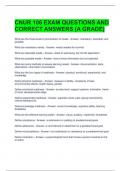CNUR 106 EXAM QUESTIONS AND
CORRECT ANSWERS (A GRADE)
What are the three levels of prioritization of needs - Answer- mandatory, desirable, and
possible
What are mandatory needs - Answer- needs needed for survival
What are desirable needs - Answer- relate to well-being, but not life dependent
What are possible needs - Answer- nice to know information but not essential
What are some methods to assess learning needs - Answer- documentation, tests,
observation, information conversation
What are the four types of readiness - Answer- physical, emotional, experiential, and
knowledge
Define physical readiness - Answer- measure of ability, complexity of task,
environmental effects, health status, gender
Define emotional readiness - Answer- anxiety level, support systems, motivation, frame
of mind, developmental stage
Define experiential readiness - Answer- aspiration level, past coping mechanisms,
cultural background,
Define knowledge readiness - Answer- current knowledge, cognitive ability, learning
disabilities
What are the different learning styles - Answer- visual, auditory, read/write, kinesthetic
Define compliance - Answer- a submission or yielding to predetermined goals
Define adherence - Answer- a commitment or attachment to a predetermined goal
Define noncompliance - Answer- non-submission or resistance to a predetermined goal
Define motivation - Answer- a psychological force that moves a person towards a kind
of action
, What are the three motivational factors - Answer- personal attributes, environmental
influences, relationship systems
under the health belief model what are the predictors of preventative health behaviour -
Answer- individual perceptions, modifying factors, likelihood of action
what are the stages of change - Answer- pre-contemplation, contemplation, preparation,
action, maintenance, relapse
what are the levels of blooms taxonomy - Answer- remembering, understanding,
applying, analyzing, evaluating, creating
what are the domains of learning - Answer- cognitive, affective, and psychomotor
what are the reasons for making a teaching plan - Answer- ensures a logical approach
to teaching, communication in writing, serves as a legal document that indicates a plan
what serves as a guide to a teaching plan - Answer- goals and objectives
what are teacher directed strategies - Answer- one to one instruction, lecture, lecture
with discussion, demonstration/return demonstration
what are teacher facilitated strategies - Answer- group activists, role-play, simulation
what are learner directed strategies - Answer- games, self-directed, peer counselling
an evaluation is... - Answer- a process, demonstrates effectiveness, and guides the
direction of the next skill to be learned
what is the systematic process by which something is judged - Answer- evaluation
what is the difference between assessment and evaluation - Answer- assessment is
where you decide what you're going to do and evaluation determines if the teaching was
successful or not
what are the 5 foci of evaluation - Answer- audience, purpose (singular), question
(specific, measurable), scope (amount of time available), resources
what are the three types of evaluation - Answer- process (formative), content
evaluation, outcome (summative)
define a theory - Answer- a belief or idea that develops based on information or
evidence
according to freud which structure of the mind strives only to secure pleasure - Answer-
ID




